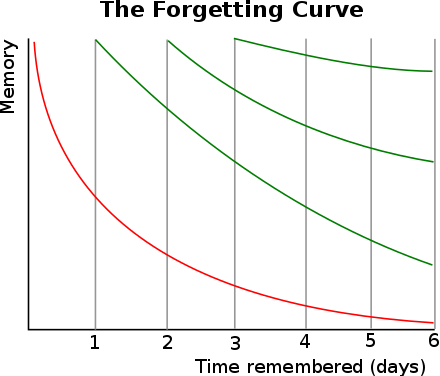📚 Study for Long Term Memory
Do you ever feel like you spend a lot of time studying, but it just doesn't stick?
Or have you done really well on a test only to forget absolutely everything a week later?
This can be really frustrating. It feels like each time you take a final, year-end, or board test, you have to start over again at the beginning.
Here we're going to talk about how to keep that information in your long term memory.
The Three Stages of Memory
Learning (or really, memory) occurs in three stages:
- Encoding
- Storage
- Retrieval
Encoding refers to the way the information gets into your brain. Storage is how you keep there over time. Retrieval is how you access the information when you need it (like to answer a test question).
Let's go through each one:
Encoding
When information comes in through your sensory orifices, it has to be changed into a form that can be stored by your brain. This is called encoding.
There are three ways information can be coded:
- Visual (picture)
- Acoustic (sound)
- Semantic (meaning)
It seems that the principle coding system for short-term memory is acoustic encoding.
This would be like if someone gives you a phone number, you could repeat it to yourself aloud in order to remember it.

But if you want to store something in long-term memory, it seems that semantic encoding is the best way (although visual and acoustic can also be used). This is when you attach some sort of meaning to the information you're trying to remember.
Or as I would always say: if you understand why something is the way it is, then if become easier to remember.
During my studies, I found there are three ways to attach meaning to a piece of information (let me know if you have more):
True Meaning
This is where you understand the actual "why" behind a piece of information.
For example, LU-10 benefits the throat because it's a Ying-Spring Fire point (so it clears heat) and because the internal pathway of the channel ascends to the throat. At least for me, connecting the point function to the category and channel pathway makes it easier to remember.
Or, the name of KD-7 is Fu Liu ("returning current"). If you have edema in the lower body due to Kidney Yang deficiency, then KD-7 can "return" the water to its source in the Kidney. So knowing the meaning of the name can help you remember the function.
Invented Meaning
This is where you create a story that isn't necessarily true, but still gives the information some sort of meaning.
For example, BL-57 is good for hemorrhoids because the point location looks like a butt. 🍑
Or, Wu Zhu Yu sounds like "Wu Zhu you stop vomiting?" 🤮
Personal Meaning
This is where you have a personal experience of the information being used.
For example, as an observer I saw a patient with a particular set of symptoms. Our supervisor told us to use HT-7 and showed us a special technique of needling the point from the side. Because of that experience, I remembered the location and functions of HT-7 every day after that.
So if you want the information to stick long-term, it helps if you can attach some sort of meaning to it. This takes a lot more work up front, but it pays off in the long run.
(Sidenote: this is why my YouTube videos are so long. I'm trying to attach meaning to all of the information so that it will be easier to remember long-term.)
Storage
Storage refers to how you keep the information in your brain after it has been encoded.
Memory tends to decay over time (this is called the "forgetting curve"), so a way to combat this is to use a strategy of "spaced repetition."

Basically, if you spend time studying something, it's likely that you'll have forgotten half of it a few days later. So you go back and repeat the information. With each repetition, you remember more and it lasts longer. As the memory gets stronger, you can increase the amount of time between repetitions.
For example, I know from personal experience that if I really want to remember something, I have to learn it, forget it, and re-learn it at least three times in order for it to stick. This is why regular studying is important.
And here, I think it's important to point out the difference between recognition and recollection.
I've seen many students that just flip through their flashcards or skim over their notes and say, "Oh yeah, I remember that." But then when they get to the test, they come up blank.
That's because when they flipped through their notes, they recognized the information, so they thought they knew it. But really, you should close your notes and make sure that you can recall the information from nothing.
So after you put the information in your brain (hopefully by attaching some meaning to it), you still have to hit the "refresh" button every now and then to make sure it stays there.
Retrieval
Retrieval is how you get the information back out of your brain so you can use it when you need it.
For example, if you see someone's face and then try to think of their name, the visual cue of seeing their face triggered the retrieval process.
So if you've ever said, "Oh I know that... it's on the tip of my tongue..." that means the information is there, but you just have a retrieval issue.
So one strategy might be to use certain "cues" or "triggers" when you encode the information (this is why it's easier to remember something when you're in the same room where you learned it).
For example, whenever I studied points, I would always touch the point on my own body as I read the location, actions, and indications. Then, when I got to the test, if I had a question about LU-1, I would touch LU-1 on myself in order trigger the information.
One way this worked against me was with herbs. Initially, I used to study by looking at my herb samples. I would pick up Ma Huang and say, "This is Ma Huang, it releases the exterior, etc." The problem was, when I got to the test, I couldn't remember anything. I had trained myself to remember by looking at the physical herbs; when I saw the letters "ma huang" on the page, it didn't have the same effect.
Conclusion
So you want to remember things long-term. That way the information is still there when you get to boards and beyond.
Here are some strategies to do that:
- Attach meaning to the information when you learn it. Research the "why" behind it, or make up your own story.
- Use spaced repetition to keep it from fading. This could be flashcards, notes, or whatever, just make sure that you're actively recalling the information.
- Incorporate cues or triggers when you study and use them as a retrieval method. Also, make sure you study the way you're going to be tested.
Let me know if you think this is helpful or interesting. I may try to expand it into a full YouTube video.

